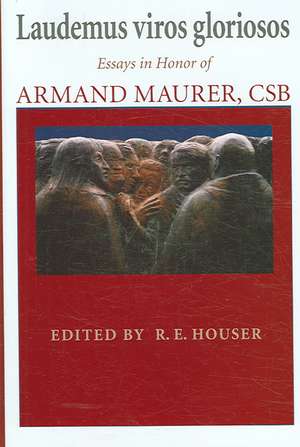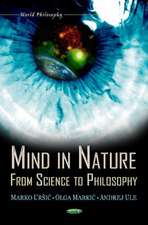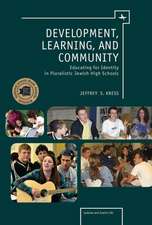Laudemus viros gloriosos – Essays in Honor of Armand Maurer, CSB: Thomistic Studies
Autor R. E. Houseren Limba Engleză Hardback – 30 mar 2007
Preț: 403.04 lei
Nou
Puncte Express: 605
Preț estimativ în valută:
77.13€ • 80.23$ • 63.68£
77.13€ • 80.23$ • 63.68£
Carte tipărită la comandă
Livrare economică 15-29 aprilie
Preluare comenzi: 021 569.72.76
Specificații
ISBN-13: 9780268031039
ISBN-10: 0268031037
Pagini: 406
Ilustrații: Frontispiece
Dimensiuni: 159 x 236 x 28 mm
Greutate: 0.68 kg
Ediția:1
Editura: MR – University of Notre Dame Press
Seria Thomistic Studies
ISBN-10: 0268031037
Pagini: 406
Ilustrații: Frontispiece
Dimensiuni: 159 x 236 x 28 mm
Greutate: 0.68 kg
Ediția:1
Editura: MR – University of Notre Dame Press
Seria Thomistic Studies
Recenzii
“This volume is dedicated to one of the most outstanding historians of medieval philosophy of our time: Armand Maurer. . . . [The] carefully organized volume offers a wide range of extremely inspiring essays which reflect many of Maurer’s interests and much of his work. . . . [It] is indeed a manifest proof that Maurer’s important work is being continued by his pupils and friends.” —Notre Dame Philosophical Reviews
“Fr. Maurer's work at the Pontifical Institute for Medieval Studies and the U. of Toronto has made him a premier historian of medieval philosophy, and here his friends, colleagues and former students provide 15 essays that reflect the range and depth of this studies.” —Reference and Research Book News
“. . . All the contributors are or were ‘friends, students, and colleagues’ of Maurer, and all the essays deal with Maurer’s avocation—medieval philosophy. Although it is a commonplace in reviews of such anthologies to complain of uneven quality, happily in the present case the essays are almost uniformly well-written and well-argued.” —Choice
Notă biografică
R. E. Houser is professor of philosophy at the University of St. Thomas and the Center for Thomistic Studies. He is the author and editor of a number of books, including The Cardinal Virtues: Aquinas, Albert, Philip the Chancellor.
Descriere
This book of fifteen essays is presented in honor of one of the premier historians of medieval philosophy, Armand Maurer of the Pontifical Institute for Mediaeval Studies and the University of Toronto. The authors, internationally recognized scholars in the field of medieval philosophy and theology, are friends, colleagues, and students of Fr. Maurer. They are united in a common love of medieval thought and a common appreciation of philosophizing through the study of the history of philosophy. Their interests and methodologies, however, are diverse, and cover a range from Justin Marytr, who died during the reign of Marcus Aurelius, to Bartholomew Mastrius, a contemporary of Descartes.
“This is a volume that honors the memory of Armand Maurer not only by reviewing his own scholarly achievements but by advancing the state of scholarship on the subject that he loved, the philosophy of the middle ages. The range of topics covered here richly reflect the pluralism of medieval thought. Some of the essays gathered for this collection give a fresh look at important perennial themes like the nature of Christian philosophy and the real distinction between essence and existence. Others turn—as Maurer loved to do—to figures who are studied less often (Peter of Candia, for example, or Francis of Mayronis) that help fill out our knowledge of this period and add to our sense of the contributions that study of medieval authors can make for contemporary philosophizing.” —Joseph W. Koterski, S.J., Fordham University
“This lovely Festschrift for Armand Maurer contains fourteen essays by distinguished scholars on the tradition of medieval philosophy, from its ancient origins to seventeenth-century inheritors. Since many essays treat large-scale movements or fundamental issues, the volume will be useful to serious undergraduates and graduate students, as well as to scholars. Laudemus indeed: from the editor’s moving tribute to Armand Maurer, through discussions of Avicenna and Thomas and Ockham, to Maurer’s closing recollections of his teachers, this volume is full of well-earned praise.” —Donald Morrison, Rice University



















